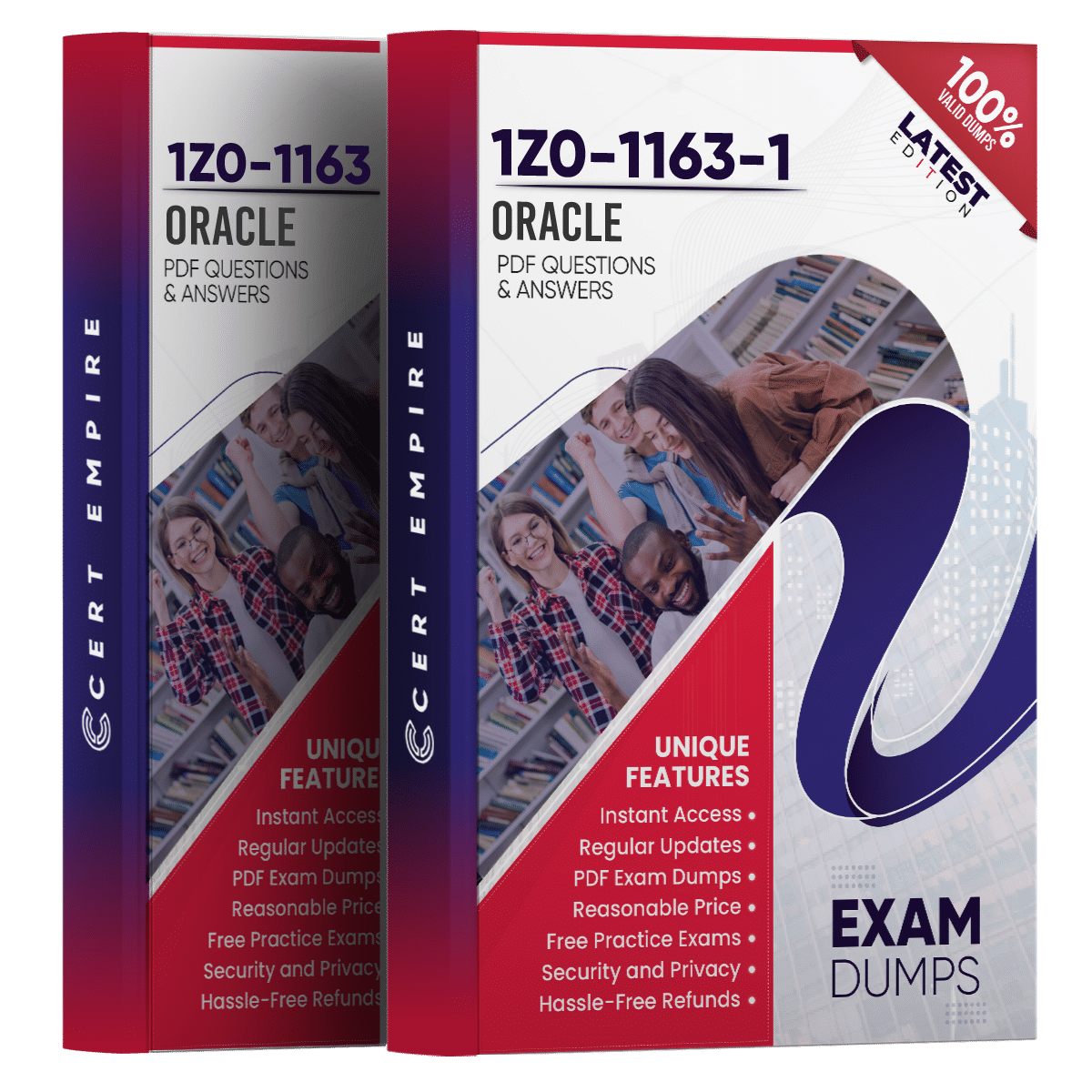About 1Z0-1163-1 Exam
Why Oracle 1Z0-1163-1 Certification is a Game-Changer for Supply Chain Professionals
Supply Chain Management (SCM) has become the backbone of businesses that aim for operational efficiency, cost savings, and customer satisfaction. Companies worldwide depend on Oracle’s Fusion Cloud SCM to streamline logistics, procurement, inventory, and order management. However, mastering these tools requires expertise, which is exactly what the Oracle 1Z0-1163-1 Fusion Cloud Applications SCM Foundations Associate Certification validates.
This certification isn’t just about earning a title; it’s proof that you understand how Oracle Cloud SCM works in real-world scenarios. Organizations trust certified professionals to configure, manage, and optimize their supply chain operations in the cloud. Whether you’re aiming to start your career in supply chain or advance to more technical roles, this certification gives you an advantage.
Who Should Get This Certification?
This certification is a strong fit for a variety of professionals, including:
- New graduates entering the SCM industry – If you’re looking for a job in supply chain management, having an Oracle certification proves you understand the core functionalities of Oracle SCM Cloud.
- IT professionals shifting to cloud-based supply chain roles – As businesses move from on-premise systems to cloud platforms, IT specialists must upgrade their skills to remain relevant.
- Business analysts, consultants, and ERP professionals – Understanding Oracle SCM helps analysts and consultants provide better solutions to clients, making them more valuable in their roles.
- Current Oracle Cloud users who want certification – If you already work with Oracle Fusion SCM Cloud, this certification adds credibility to your expertise.
How This Certification Boosts Your Career
Earning this certification can significantly impact your professional growth in the following ways:
- Better job opportunities – Companies hiring for SCM, logistics, and cloud-based ERP roles prefer candidates who have Oracle certifications.
- Higher earning potential – Professionals with Oracle SCM Cloud expertise command higher salaries compared to those with only traditional supply chain experience.
- Industry recognition – Oracle certifications are well-known globally, making it easier to apply for roles in different regions and industries.
Breaking Down the Oracle 1Z0-1163-1 Exam
Understanding the exam structure helps in preparation. Here’s what you need to know:
Exam Format and Key Details
- Number of Questions: Around 55-60
- Question Type: Multiple-choice
- Duration: 90 minutes
- Passing Score: ~65% (Oracle does not always disclose the exact passing criteria)
- Exam Mode: Online proctored or at a test center
Oracle designs the exam to test how well candidates understand and apply Fusion SCM Cloud functionalities. The questions are not just theoretical; they assess real-world application, requiring you to analyze different business scenarios.
What’s Covered in the Oracle 1Z0-1163-1 Exam?
The 1Z0-1163-1 exam focuses on key supply chain functions within Oracle Fusion SCM Cloud. Below are the major topics you’ll encounter.
Understanding Oracle Fusion SCM Basics
Oracle Fusion SCM is a cloud-based solution that automates and optimizes supply chain activities. Candidates should understand:
- Why businesses are shifting to cloud-based SCM – Unlike on-premise systems, Oracle Fusion SCM provides real-time tracking, automation, and predictive analytics.
- Basic navigation of Oracle Fusion Cloud – Expect questions on user interfaces, dashboards, and essential functions.
- Core components and their roles – You should understand how inventory, procurement, order management, and planning modules work together.
Supply Chain Planning & Execution
Supply chain planning ensures products reach customers efficiently. The exam includes questions on:
- Demand forecasting – How companies use data to predict future demand.
- Supply planning – Balancing demand with supplier capabilities.
- Order fulfillment strategies – Ensuring timely and cost-effective delivery.
- Supplier collaboration – How businesses interact with suppliers for smooth operations.
- Risk management in SCM – Identifying and mitigating disruptions in the supply chain.
Managing Inventory & Orders
Inventory is a crucial part of the supply chain, and Oracle Fusion SCM has powerful tools for managing stock efficiently. Candidates must know:
- Inventory management concepts – How Oracle Fusion SCM helps businesses keep optimal stock levels.
- Automating order fulfillment – Setting up order workflows to reduce manual processing.
- Handling returns and refunds – How Oracle Fusion SCM manages reverse logistics and customer returns.
Procurement & Supplier Relations
Procurement is more than just buying materials it’s about choosing the right suppliers and ensuring compliance. The exam tests:
- Sourcing and selecting suppliers – Best practices in finding reliable and cost-effective vendors.
- Supplier qualification and contract management – Ensuring suppliers meet business and compliance requirements.
- Integration with financial systems – How Oracle Fusion SCM links procurement to financial transactions and reporting.
Product Lifecycle & Manufacturing
Understanding product data management and manufacturing workflows is essential. Key topics include:
- Creating and managing product definitions – How product details are structured in Oracle SCM.
- Manufacturing processes & tracking – The role of Oracle SCM in production scheduling and quality control.
- Product costing methods – How businesses calculate costs associated with manufacturing and inventory.
SCM Reporting & Analytics
Supply chains rely on data-driven decisions. The exam tests your understanding of:
- Business Intelligence (BI) tools in Oracle SCM – How to generate performance reports.
- Supply chain analytics – Understanding key metrics such as inventory turnover, supplier performance, and order accuracy.
- Using reports for decision-making – Leveraging insights to improve supply chain efficiency.
Best Strategies to Prepare for the Oracle 1Z0-1163-1 Exam
To pass the exam on your first attempt, a structured approach is necessary. Here are the most effective strategies.
Learn from Oracle’s Official Docs & Training
Oracle provides comprehensive learning materials, including:
- Oracle Learning Explorer – A free training platform with foundational courses.
- Oracle University Training – In-depth, paid courses led by Oracle experts.
- Official Oracle Documentation – A must-read for understanding SCM Cloud functionalities.
Gain Hands-On Experience with Oracle Cloud SCM
Theoretical knowledge alone won’t be enough. If possible, work on real Oracle SCM environments.
- Oracle Cloud Free Tier – Oracle offers free cloud access to explore SCM modules.
- Company Sandbox Environments – If your workplace uses Oracle SCM, practice directly.
Use Study Guides & Books
Study materials written by Oracle experts provide detailed explanations of exam topics. Look for:
- Books covering Oracle Fusion SCM basics and advanced features.
- Online courses from platforms like Udemy and Pluralsight.
- Oracle’s official Exam Preparation Guide.
Join Study Groups & Forums
Learning from others is helpful, especially when preparing for Oracle exams. Consider:
- Oracle Community Forums – Discussions with professionals and Oracle-certified experts.
- LinkedIn & Reddit Groups – Get insights from people who recently took the exam.
- Telegram & WhatsApp Groups – Many learners share tips, doubts, and study plans.
Career Growth After Oracle 1Z0-1163-1 Certification
The Oracle 1Z0-1163-1 Fusion Cloud SCM Foundations Associate Certification is widely recognized in the IT and supply chain industries. Certified professionals are in high demand, particularly as businesses move towards cloud-based ERP solutions.
Where Can This Certification Take You?
Once certified, you can apply for roles such as:
SCM Consultant
Advises businesses on optimizing supply chain operations using Oracle SCM Cloud.
Oracle Fusion SCM Functional Analyst
Implements, customizes, and manages SCM workflows in Oracle Cloud.
Supply Chain Planner
Focuses on forecasting, procurement strategies, and inventory management.
ERP Analyst
Handles enterprise system integrations for supply chain and logistics solutions.
Expected Salary for Oracle SCM Certified Professionals
Oracle-certified professionals enjoy competitive salaries across various industries. Here’s a look at average salaries based on experience level:
- Entry-level: $70,000 – $85,000
- Mid-level: $90,000 – $110,000
- Senior roles: $120,000+
Companies such as Amazon, Oracle, Accenture, IBM, and SAP are actively seeking Oracle SCM Cloud experts, making this certification a valuable asset.



Reviews
There are no reviews yet.